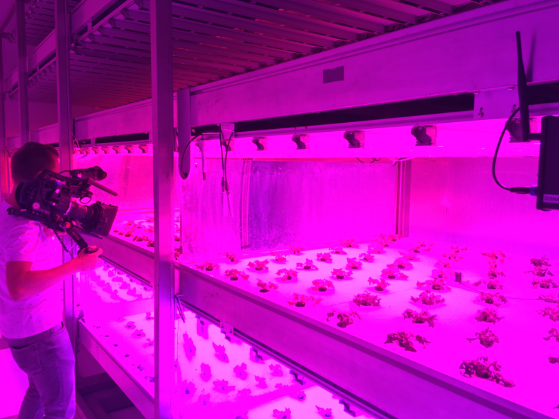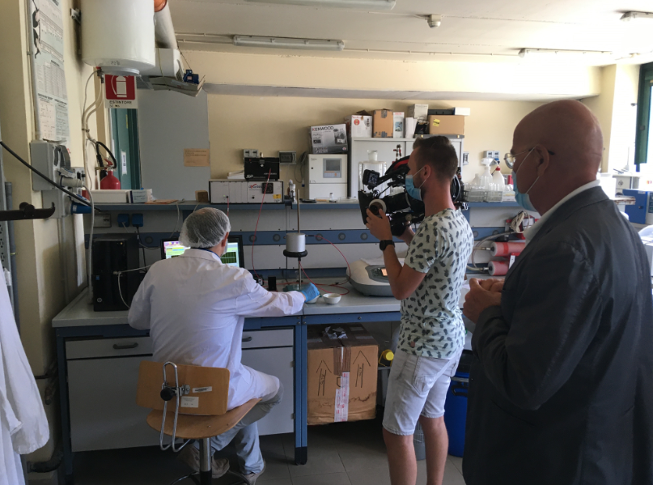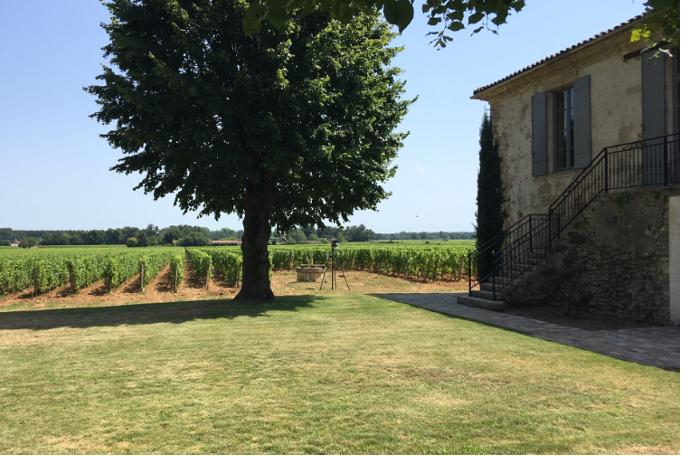Article
IoF2020 on Tour:
Catalogue of Use Cases
As you might know, our beloved project is in its final stretch and even though the current times make it difficult and require precautions, we are trying our best to stay in close connection with every single one of our 33 use cases. Hence, we came up with the idea to pay them a visit to witness first-hand the achievements and results of their hard work and talk about the diverse challenges they had to overcome to get there. During our digital or, if the conditions allowed it, personal visits, we enjoyed the place of eternal spring, got a glimpse of how we will extend shelf-life in the future and drove through the heart of European viticulture. Only a small selection of use cases and their respective test farms which play a significant role in revolutionising smart farming in the European Union and beyond.

To create the best environment for high quality herbs, fruits or vegetables, the team monitors the ideal temperature, CO2 levels, humidity, best substrates and required irrigation through the integrated GrowWise system. Since every characteristic is optimised, the results range from prolonged shelf-life, enhanced taste, higher yield and stronger plants to increased level of nutrients and vitamins. One of their eight climate rooms is dedicated to our use case: leafy vegetables, or lettuce to be precise. Thanks to LEDs it is now roughly only twice as expensive to grow lettuce in an indoor farm compared to open field agriculture. In terms of sustainability, the fresh produce moves closer to the consumer, who gets consistently great quality all year round without any applied pesticides or other agrochemicals. There is no pressure of diseases at all due to the constantly active ventilation system. Finally, it alleviates the pressure on the supply chain and the effects logistics have on the climate while saving 90% of water which usually simply evaporates in open field agriculture.
"The implications of its innovation reach far beyond those regions as they set out to revolutionise organic production and packaging of fruits and vegetables in Europe and beyond."
Table grapes are an important crop for farmers in the South Italian Regions of Puglia and Basilicata where our use case carries out its main activities. However, the implications of its innovation reach far beyond those regions as they set out to revolutionise organic production and packaging of fruits and vegetables in Europe and beyond. One success factor is certainly the way each crucial segment is embedded in a holistic system that overarches the entire value chain of organic table grapes. This also manifests on a personal level. When Vincenzo Verrastro, the Use Case Coordinator, describes the work and research they are performing he always refers to the team as a community, a family.
For Toni, the farmer, quality is of utmost importance. This requires daily dedication and effort. Not only from him, but from everyone in his community of 130 employees. It comes as no surprise that their organic table grapes are in high demand and have been awarded for unique quality standards before. Naturally, for farmers and end-users, dedicating their lives to organic table grapes or other fruits and vegetables, technologies that improve the production at farm-level are more than welcome. This is where IoT comes into play in terms of optimising the production process. And with process, we mean the entire life cycle of a product, from farm to fork.

Once the organic table grapes are harvested, we follow them on their journey where constant refrigeration is a crucial factor to ensure a shelf life of about 2 weeks. While we depart with most of them which travel along the value chain on to a packaging plant, a sample of 70kg departs on an innovative journey. This amount is necessary to run the tests that Prof. Di Renzo and his team at University of Basilicata are carrying out in the city of Potenza. Their research department includes a laboratory for packaging to investigate other crucial factors in the post-harvest period in terms of shelf life prolongation of fruits and vegetables. And here, modified atmospheric packaging (MAP) plays an important role. It is the key factor to extend the shelf life in organic production since it does not rely on any chemicals for this purpose. The research team only leverages the characteristics of natural gases present in the atmosphere such as carbon dioxide, nitrogen or oxygen. Earlier, we mentioned that this use case is about to revolutionise production as well as packaging of organic fruits and vegetables globally. This is where the patented Blow device comes into play. Even though this device only has the diameter of a finger, its effects on the post-harvest treatment of fruits and vegetables is immense as it prolongs the shelf life of, for instance, organic tables grapes from 14 to up to 70 days.
"While his grandfather initiated a step from quantity to quality (...), Jean Jacques now leverages IoT technology to control every aspect of the production process, putting the Dubourdieu family Domaines once again at the forefront of innovating wine production."
On our last trip, we arrived in the Nouvelle-Aquitaine region with Bordeaux as its capital, Mario Diaz Nava, the Use Case Coordinator, took us with him on a trip to the Heart of European viticulture. With over 2000 estates with an average of 35ha each, it is rightfully considered the epicenter of wine. One of them, the estate Denis Debourdieu, is part of this use case dedicating their 135ha to the optimization of the entire viticulture value chain. It is run by Jean Jacques, along with his brother Fabrice, who are following in their grandfather’s and father’s enthusiastic footsteps to improve viticulture in this region. While his grandfather initiated a step from quantity to quality as he identified the molecules responsible for the taste of wine, Jean Jacques now leverages IoT technology to control every aspect of the production process, putting the Dubourdieu family Domaines once again at the forefront of innovating wine production.

Since viticulture is deeply rooted in historical guidelines and delicate or tiresome practices, the team strikes an equilibrium between respect to traditions and weather stations, in-field sensors or hyperspectral cameras combined with algorithms. For instance, the irrigation of vines classified as AOC (controlled designation of origin) in France is prohibited during a certain period to limit an excessive burden. It is only exceptionally authorized due to extreme ecological conditions. So, how can one monitor all those parameters that are crucial when producing wine of finest quality? And it goes without saying that implementing and developing such an unprecedented system necessitates to overcome challenges, deal with frustrations but first and foremost gain momentum out of the successes.
Does all this sound like you missed out on impressive applications of precision agriculture? Undoubtedly. But, fortunately, we did all that with a camera as our companion and will soon share all those movies alongside a more detailed written story with you!
So, make sure to stay tuned.

By Manuel Winter
Use Cases Relations